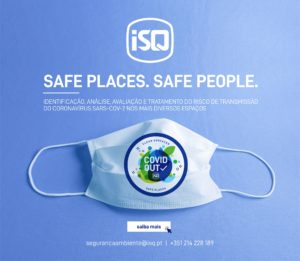COVID OUT: ISQ DEVELOPS SURFACE AND FACILITY ANALYSIS SERVICE
The current pandemic moment we are experiencing requires several adaptations in our way of acting and the return to the new normal will have to be done safely. For this reason, the cleaning and hygiene of surfaces, objects and installations is particularly relevant in interrupting the transmission of SARS-CoV-2 and other respiratory diseases of viral origin, whether in the work space, leisure or others. "In this context, in a pioneering initiative at national level, ISQ launches the COVID OUT service with a view to identifying, analyzing, evaluating and treating the risk of transmission of SARS-CoV-2, ensuring that users of the spaces have the confidence and safety of their use," said João Safara, ISQ administrator. As the pandemic seems to have already reached the peak, or plateau, plans begin to be outlined for lifting restrictions. The country cannot stop and the economy must resume its normality (possible) quickly. Therefore, it is essential "to ensure that spaces are able to receive people. It is important to carry out a rigorous evaluation of the spaces that are able to open", adds João Safara. "This service, along with others being finalised, is a way for ISQ to strengthen its commitment to society and the economy, thereby making a committed contribution to such a relevant area as is strengthening people's trust and safeguarding their security and communities, going to the deepest purpose of ISQ's existence", adds João Safara. All types of surfaces are covered by COVID OUT, from "switches, machines, tables, car steering wheels, countertops, door handles, cabinet handles, stair railings, washbasin taps, elevator buttons, monitors, computer keyboards, tablets, mobile phones," recalls Maria Manuel Farinha, ISQ Environment and Security Officer, " since the evidence that SARS-Cov-2 infections are found through contaminated surfaces and objects is increasing." ISQ technicians identify risk factors and critical points, define a sampling plan for sample collection and analysis, with results in 48 hours. They also define an integrated action plan as well as monitoring the effectiveness of the control measures implemented. The safety of the sites will be attested by the issuance of a "Seal of Trust", which ensures that the effectiveness of the measures implemented has been carried out to control the transmission of Coronavirus and ensure that the sites are safe.

